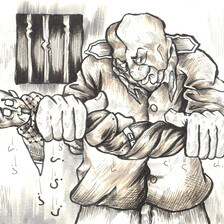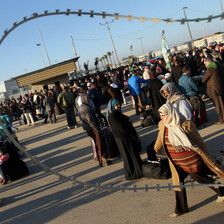The Electronic Intifada Ramallah 31 October 2013

Lawyer Anas Barghouthi was charged in relation to organizing Prisoner solidarity demonstrations.
APA imagesIsrael is targeting Palestinians advocating for the rights of political prisoners to disrupt their work, say a lawyer facing jail time and the director of the prisoner rights group Addameer, who has been banned from travel.
On 23 October, Anas Barghouthi, a prominent Palestinian lawyer, was released on bail from Ofer Military Prison near the city of Ramallah in the occupied West Bank. An Israeli military court charged Barghouthi with organizing solidarity demonstrations; he faces a new hearing in November.
Barghouthi, 30, was targeted for arrest after a long record of support work as legal counsel for Palestinian prisoners in Israeli military courts and as legal defense in Palestinian Authority courts.
Israeli soldiers arrested Barghouthi on 15 September while he was traveling between Ramallah and Bethlehem, cities situated in the central region of the occupied West Bank.
Clean record
Although Barghouthi has a clean record and no prior arrests, he had to pay a fine of 12,000 shekels (more than $3,400) after a long legal struggle by his lawyer, Mahmoud Hassan. Hassan successfully convinced an Israeli judge to allow Barghouthi to be released on bail.
The judge agreed to grant bail on the grounds that evidence against him — alleged testimony of other prisoners — did not prove Barghouthi’s identity or that he is a “security threat” to Israel. The fact that the allegations concern supposed events from more than a year ago was also cited by the military judge.
Two acquaintances had to vouch for Barghouthi and sign agreements that they will pay a fine of 15,000 shekels (approximately $4,285) each if he violates the conditions of his bail.
Though allotted a 24-hour period to object, an Israeli military prosecutor did not appeal his bail.
Barghouthi told The Electronic Intifada that his arrest “is part of the Israeli occupation’s policies. They are afraid of anyone that tells them ‘No.’ If you look at who’s behind bars, you’ll find that they arrest students, intellectuals, women, children, the elderly — everyone.”
Barghouthi has been charged with “leadership of a committee to organize solidarity demonstrations for Palestinian prisoners,” he said, which Amnesty International confirmed. He has also been charged with membership in the Popular Front for the Liberation of Palestine — a political party Israel has banned.
In a statement, Amnesty demanded that Israel drop charges against Barghouthi, who they said would be a prisoner of conscience if jailed.
Barghouthi’s next hearing is on 5 November, and he faces up to 18 months in prison if found guilty by Israel’s military court.
Arrest
On the day of his arrest in September, Barghouthi was returning to Ramallah after visiting friends. A military jeep “stopped the car and asked for our identity cards,” he recalled. “I showed them my ID and a card proving my valid status as a practicing lawyer. But another soldier came back to the car and immediately handcuffed me.”
The soldiers proceeded to confiscate his cell phone, blindfold and interrogate him on the spot.
“They start asking me a lot of questions about who I was with. I was blindfolded and they hit me in the back. Then they took me to a small makeshift concrete room on the side of the road” near a checkpoint, Barghouthi said.
An Israeli military commander came and informed Barghouthi that he was under arrest. When he asked why, the commander told him, “you’ll find out soon.”
“I sat handcuffed and blindfolded for around three hours at the checkpoint before they took me to a military interrogation center” at Kfar Etzion, one of Israel’s settlement colonies in the West Bank.
Before they arrived there “they drove me around for an hour,” Barghouthi added. “They took me out and walked me around blindfolded. They made me sit on the ground outside. I was very tired, and then when the blindfold was removed I was in a military clinic.”
Afterwards, Barghouthi was strip-searched, given prison clothing and put in a cell with four other prisoners.
“The first day in the cell they only gave me two pieces of tomato, a small yogurt and a small piece of bread.” Aside from that, he said, he was not fed.
An Israeli intelligence officer came to interrogate him. After telling Barghouthi that “they were just getting to know each other,” he told him he would “need to rest and sleep” before the real interrogation began.
“I told him that [for] two years I was coming to their courts to defend Palestinian prisoners, and that was why I am now their prisoner,” Barghouthi added.
It was only on the third day that he was taken to a military court and formally charged.
“It was very hard for my parents, family and friends while I was in jail, but it’s nothing compared to the thousands who are in Israeli prisons — some have been there for over thirty years,” he explained.
As of last month, there are 5,007 Palestinian political prisoners in Israeli prisons, according to Addameer, the Palestinian prisoner support association.
Of those, 516 prisoners are serving life sentences, and another 449 are serving sentences of twenty years or more. An additional 137 are being held under administrative detention, a draconian Israeli practice of imprisoning Palestinians on “secret evidence” without charges.
Outlawing prisoner solidarity
Barghouthi is well-known for his advocacy on behalf of Palestinian political prisoners in both Israeli and Palestinian Authority prisons.
After working as a lawyer for Addameer since 2009, he left the organization earlier this year but continued to remain involved with the group as a volunteer. “They [Israeli forces] have targeted me and my colleagues … as well as raided the office [in December 2012] as a method of scaring us into stopping our work,” Barghouthi said.
Addameer employees have been routinely harassed and targeted by Israeli occupation authorities.
Ayman Nasser, a human rights researcher for the organization, was imprisoned in October 2012 before being charged with activities related to popular organizing and prisoner solidarity.
A resident of occupied East Jerusalem, Addameer’s 71-year-old chairperson Abdullatif Ghaith has been banned by successive military decrees from traveling internationally or entering the West Bank since October 2011.
Just a week after Barghouthi was arrested, Samir Arbid, an accountant at Addameer, was arrested by Israeli forces and put in administrative detention for an initial period of four months.
“This will not end until the occupation ends,” Barghouthi commented. “They want to occupy us without our resistance — this is stupidity.”
“They are scared because the prisoners are normal people who need their rights [and] it’s so clearly a case for justice … Israel says it’s a victory for their security each time they arrest a Palestinian, but for us it’s a victory that it shows the crimes of the occupation.”
Addameer’s Abdullatif Ghaith told The Electronic Intifada that the environment has grown increasingly difficult for people campaigning for prisoner solidarity.
“They lie to lawyers who come to see their clients. They move prisoners that same day [that the visit is scheduled] or tell them that the prisoner is not present that day,” he said.
Although Israel is “trying to arrest as many people as possible to prevent our resistance,” Ghaith said, “the battle inside the prisons has appeared.” Many efforts towards international solidarity have centered around Palestinian hunger strikers and other prisoner struggles in recent years.
Support
Both Palestinian and international human rights organizations have come out in support of Barghouthi.
On 3 October, Amnesty International issued an urgent appeal for action on Barghouthi’s behalf, stating: “Amnesty International considers Anas Barghouthi to be a prisoner of conscience, detained for his work as a lawyer supporting the human rights of Palestinian prisoners and for the peaceful expression of political views.”
Barghouthi’s case was also raised in the European Parliament.
This support was not matched by the Palestinian Authority. “Clearly, there was no interaction or efforts on my behalf from the PA,” Barghouthi stated.
Adding that the PA and its prisoner ministry has only done “the bare minimum” for Palestinian political prisoners in Israeli lockup, Barghouthi decried the PA for its “security coordination with the occupation.”
“They claim to represent the Palestinian people, but they need to know that we’ll never give up on our prisoners’ cause. They need to know that we’ll continue fighting for our prisoners and that we’ll never accept them leaving 5,000 prisoners without liberation.”
Israeli military courts routinely imprison Palestinians on little or no evidence. Although Barghouthi is preparing for the likelihood of going to prison, he has vowed to continue his work on behalf of “Palestinian prisoners in both Israeli and Palestinian Authority prisons. This is a duty — not doing it is betrayal.”
Barghouthi called on the international community to increase its solidarity efforts. The world has “to say that they’re against this occupation and take a stance. I’m telling you that the prisoners’ movement is not going to stop until Israel’s occupation is gone.”
Patrick O. Strickland is an independent journalist whose writing has appeared at Al Jazeera English, The Electronic Intifada, AlterNet, and others. Follow him on Twitter: @P_Strickland_.




